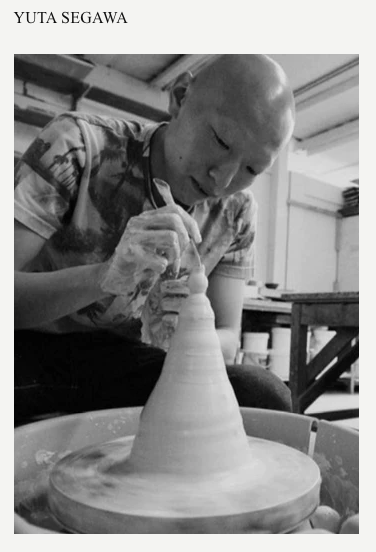Yuta Segawa Japanese Ceramic Artist producing miniature
Discover everything about Yuta Segawa, the renowned ceramic artist known for blending beauty and precision in his art. Find the latest news and information about his work here. รีวิวทางเข้าสล็อตเว็บตรง2025
Yuta Segawa or Yutasegawa.com Throwing perfectly shaped vessels on a pottery wheel is already an impressive skill, but Japanese ceramicist Yuta Segawa takes this art form to the next level by crafting miniature vases. His ever-growing collection boasts over 1,000 tiny, colorful vases, each painstakingly detailed as if they were full-sized pieces.
Segawa initially learned the art of ceramics in Japan and China, but it was during his time in London that he honed his expertise in crafting miniature pottery. Every individual vase is meticulously hand-thrown, with many featuring exquisite, delicately formed feet and long, fragile necks. Beyond his proficiency on the potter’s wheel, Segawa has created 500 unique glazes, further enriching his artistry. When arranged and photographed in groups, his collection of tiny vases presents a vibrant spectrum of colors and tones.

Yutasegawa.com
Segawa’s decision to downsize the traditional craft of ceramics was driven by a desire to challenge himself. In his own words, “Miniature pottery delves into the relationship between artists’ bodies and their creations, pushing the boundaries of what the human body can achieve on such a diminutive scale.”
“With a palette of over 1,000 specially formulated glazes, Yuta Segawa meticulously crafts miniature pots through the art of hand-throwing. These pots are so diminutive that one can cradle several in the palm of their hand, pushing the boundaries of micro craftsmanship to their limits. These petite creations have garnered significant acclaim, as the Camberwell College of Arts graduate managed to sell his entire stock of 500 at Ceramic Art London.
Inspired by Scandinavian artists like Berndt Friberg and Stig Lindberg, renowned for their small-scale ceramic works, Segawa has elevated the world of miniatures to a new level. As he explains, “There’s an enigmatic allure to crafting miniature pots. You don’t require a grand scale to convey the beauty of clay, glazes, and forms.”
Find us
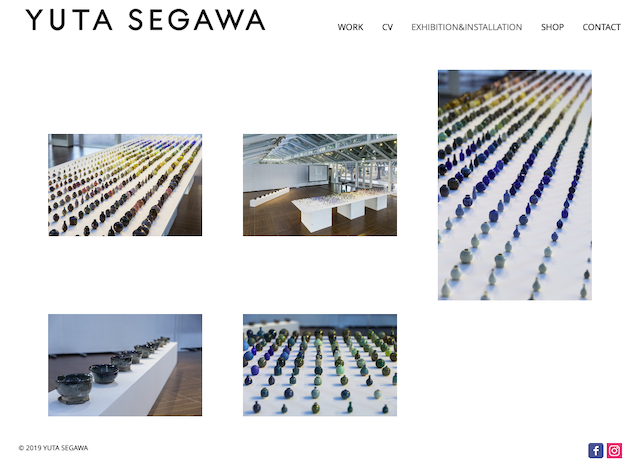
Online Shopping Yuta Segawa Ceramic
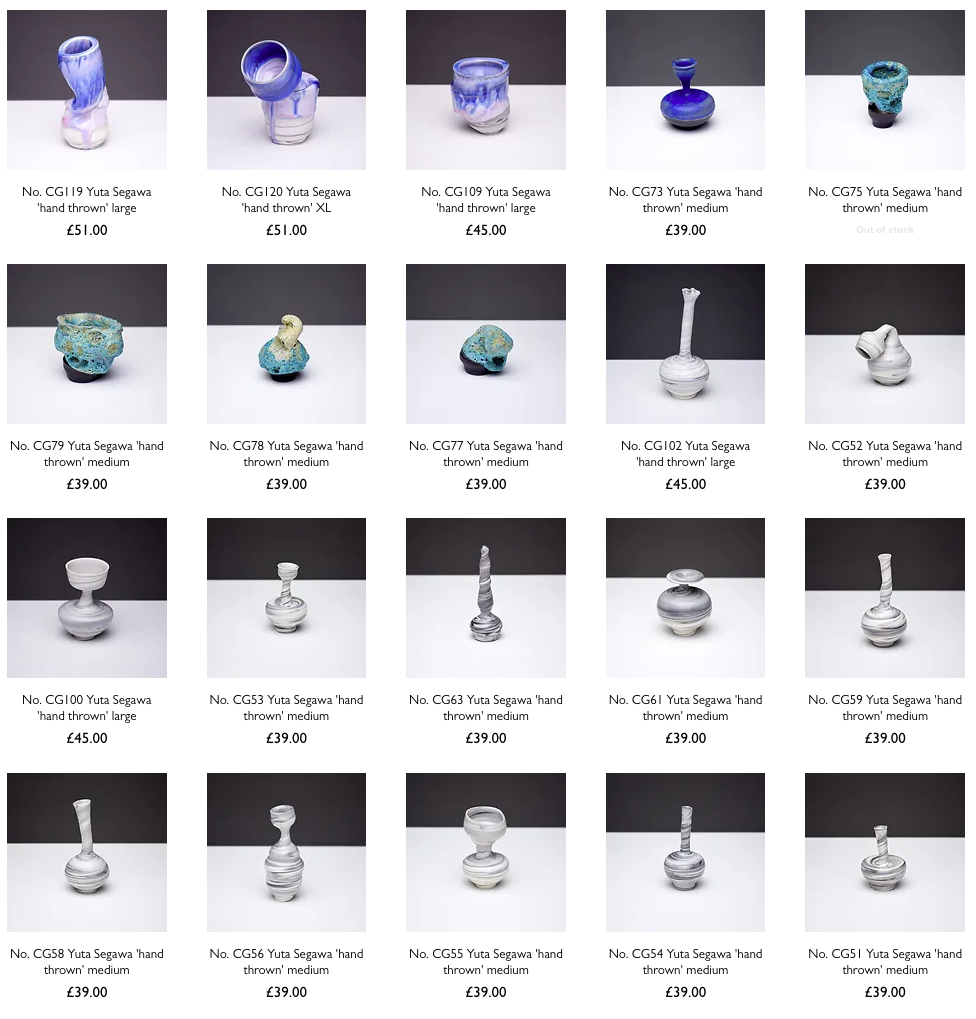
Click shopping online exhibition
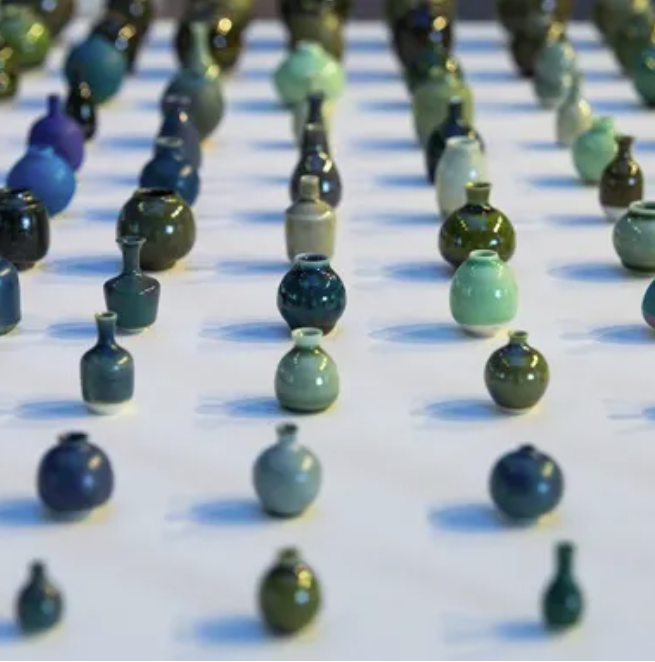
Segawa Ceramic Artist
Yuta Segawa is a Japanese ceramic artist known for his miniature potter. All of Segawa’s miniature pots are thrown by hand and he has more than five hundred original glazes which he applies to each miniature.
He lives and works in London and has had solo exhibitions in London, The Netherlands, Dubai, Tokyo and China.
Taken at Yuta Segawa’s studio on 29 November 2016.
BORN: 1988
PLACE OF BIRTH: SHIZUOKA, JAPAN
Originally from Japan, Yuta Segawa lives and works in London specialising in producing miniature pottery. He honed his ceramic skills in Japan, China, and London; completing a BA at Musashion Art University, Toyko and his MA at Camberwell College of Arts, London. All of Segawa’s miniature pots are thrown individually by hand and he has more than five hundred original glazes which he applies to each miniature. Working in miniature poses a real challenge – testing the limits of what a human body can make on such a small scale. Segawa’s work has been exhibited both in the UK and internationally.
Yuta Segawa is a highly acclaimed ceramic artist, born in Shizuoka, Japan, and now living and working in London. Segawa studied Industrial, Interior and Craft Design at Musashino Art University in Tokyo, before completing an internship at The Pottery Work Shop in Jingdezhen, China, and an MA at Camberwell College of Arts in London. Ceramic skills honed during his training are combined in his characteristic miniature pots.
Segawa experiments with texture and uses various clays such as porcelain, terracotta and stoneware when hand-throwing his small-scale vases. Hand-finished using more than five hundred specially developed glazes which encompass the entire colour spectrum, when positioned in large groups the vessels have a magical effect. Additionally, as individual pieces that sit in the palm of the hand, Segawa’s work plays with the imagination and explores the possibilities of working on a very small scale. His work has been exhibited internationally.
Yuta Segawa is a Japanese ceramic artist specialising in producing miniature pottery. He learned fine-art ceramic skills in Japan and China and developed techniques in producing miniature pots in London. All miniature pots are thrown individually by hand and he uses more than five hundred original glazes. “Miniature pottery relates to the issue of the relationship between artists’ bodies and their works. It is a challenge to test the limits of what a human body can make on such a small scale”.
Born in 1988 in Shizuoka, Japan, Yuta Segawa studied ceramics at Camberwell College of Arts, London, Musashino Art University, Tokyo and Jingdezhen, China. He has held solo exhibitions in London, The Netherlands, Dubai, Tokyo, China, and has a solo ceramics exhibition scheduled for this December at David Simon Contemporary.
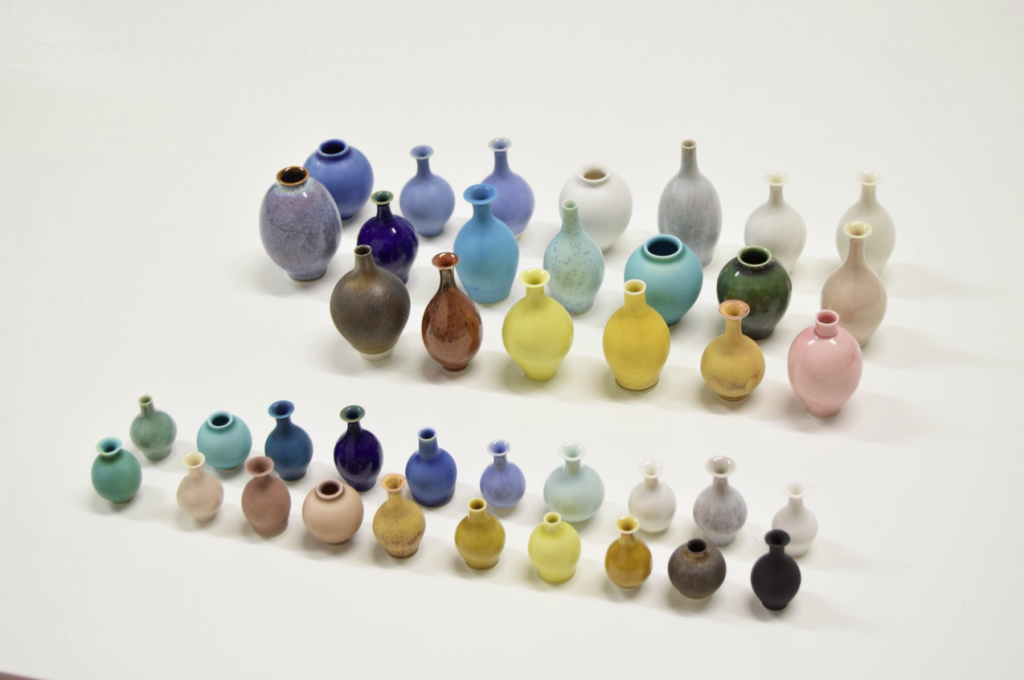
YutaSegawa Japanese Ceramic Artist
“YUTA SEGAWA LOOKS AT THE RELATIONSHIP BETWEEN ARTISTS’ BODIES & THEIR WORKS. TESTING THE LIMITS OF WHAT A HUMAN BODY CAN MAKE ON SUCH A SMALL SCALE.”
A Japanese ceramic artist producing miniature vases. Segawa traditionally trained in Japan and China and then further developed his techniques of miniature vases in London. Segawa creates miniature ceramics, hand-thrown and glazed from his vast glaze recipe collection. He uses a range of clays from stoneware, to earthenware and to porcelain. His pieces form miniature landscapes across surfaces and are to be held, placed and found across the home.
Yuta Segawa is a Japanese ceramic artist specialising in producing miniature pottery. He learned high ceramic skills in Japan and China and developed these skills into techniques for making miniature pots in London.
All miniature pots are individually thrown by hand and Yuta uses more than five hundred original, hand-made glazes. Miniature pottery relates to the issue of the relationship between artists’ bodies and their works. It is a challenge to test the limits of what a human body can make on such a small scale.
Yuta Segawa is a Japanese ceramic artist specialising in producing miniature pottery. He learned advanced ceramic skills in Japan and China and developed it into techniques of miniature pots in London.
All miniature pots are thrown individually by hand and he use more than a thousand original glazes he made. Miniature pottery relates to the issue of the relationship between artists’
bodies and their works. It is a challenge to test the limits of what a human body can make on such a small scale.
Yuta Segawa is a Japanese ceramic artist living in London. He is very well known for his miniature pots that he throws individually by hand after honing the advanced ceramic skills he learnt in Japan and China. He has created more than five hundred original glazes that he uses to decorate each unique piece.
“Miniature pottery relates to the issue of the relationship between artists’ bodies and their works. It is a challenge to test the limits of what a human body can make on such a small scale.” SGW Lab
We also stock a great selection of Yuta’s Mugs and Tumblers. Keep an eye on our website, or sign up to our newsletter, to hear of new miniature arrivals at Kobi & Teal.
Yuta Segawa is a Japanese ceramic artist who lives and works in London. He specializes in small-scale pieces in a variety of shapes that display historical influence filtered through a modern aesthetic.
This series in dark chocolate brown clay with a matte white glaze contains six styles, but each handmade piece offers variations on the theme. Sizes range from 3.5-6 inches, big enough to hold a couple of stems or even a small bouquet, depending on mouth dimension. With or without blooms, each is lovely on its own, or in a grouping, atop your nightstand, bathroom counter, desktop or wherever you want to catch sight of something beautiful.
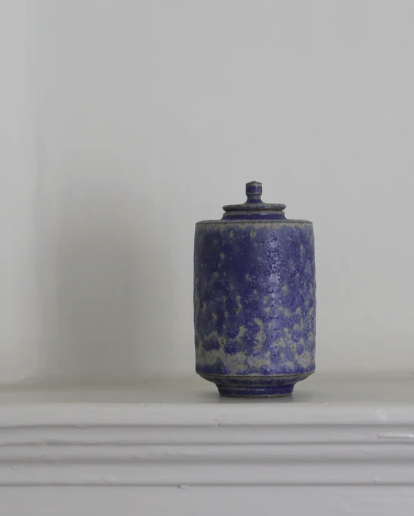
The detailed biography of Yuta
Yuta Segawa is a renowned Japanese ceramic artist born in 1984 in Tokyo, Japan. He received his education in art and ceramics from the prestigious Tokyo University of the Arts, one of the leading art institutions in Japan.
After graduating, Segawa began creating his distinctive ceramic works, utilizing traditional Japanese ceramic techniques such as hand-building and firing in traditional kilns. His ceramic pieces often feature simple yet elegant forms, but with a depth of concept and expression.
Segawa’s works are characterized by his use of natural colors and firing techniques that result in intriguing surface textures. He is known for his mastery of traditional Japanese ceramic aesthetics, while infusing his own unique artistic vision into his creations.
Over the past several years, Yuta Segawa has gained international recognition for his exceptional ceramic art. His works have been featured in prestigious exhibitions and galleries around the world, including in Japan, the United States, and Europe.
Currently, Yuta Segawa continues to live and work in Tokyo, Japan, where he remains dedicated to creating his signature ceramic pieces that blend traditional techniques with contemporary artistic expression. He is widely regarded as one of the leading ceramic artists in the world today.
Overview of 5 notable ceramic works by YutaSegawa.
-
Ceramic Bowls
Segawa is renowned for his elegant, minimalist ceramic bowls that showcase his mastery of traditional Japanese pottery techniques. His bowls often feature simple, organic forms accentuated by natural glaze effects from his firing methods.
-
Ceramic Vases
Segawa’s vase designs are characterized by their clean, understated lines and subtle, earthy color palettes that reflect his aesthetic sensibilities. The unique surface textures of his vases are achieved through his specialized firing processes.
-
Ceramic Plates
The ceramic plates created by Yuta Segawa are praised for their refined, pared-down designs that allow the inherent beauty of the clay and glazes to shine. His plates often feature soft, muted tones that complement a wide range of dining settings.
-
Ceramic Cups and Mugs
Segawa’s ceramic cups and mugs are highly sought after for their comfortable, ergonomic shapes and distinctive surface finishes. His mastery of form and function is evident in these functional ceramic pieces.
-
Ceramic Sculptures
In addition to his utilitarian ceramic works, Yuta Segawa has also produced small-scale ceramic sculptures that demonstrate his skill in sculpting and form-making. These sculptural pieces showcase his artistic vision and technical prowess.
What is Ceramic Bowls ?
Ceramic bowls are a type of functional pottery item created by ceramic artists like Yuta Segawa. Here are some key details about ceramic bowls
-
Form and Design
- Ceramic bowls typically have a round, concave shape that is designed to hold food, liquids, or other contents.
- The designs can range from simple, minimalist forms to more elaborate, decorative styles.
- Yuta Segawa is known for his elegant, understated ceramic bowl designs that showcase the inherent beauty of the clay.
-
Craftsmanship
- Ceramic bowls are handcrafted using traditional pottery techniques like hand-building, wheel-throwing, and slip-casting.
- The bowls are then fired in a kiln at high temperatures to harden and strengthen the clay.
- Segawa is praised for his mastery of these traditional Japanese ceramic methods.
-
Surface Treatments
- Ceramic bowls can feature a variety of surface finishes, from smooth, glossy glazes to more textured, matte surfaces.
- Segawa often utilizes natural glaze effects and firing techniques to create unique surface qualities on his ceramic bowls.
-
Functionality
- Ceramic bowls are designed to be practical, functional objects for serving food, holding liquids, or decorative display.
- Segawa’s bowls are prized not only for their aesthetic qualities, but also for their comfortable, ergonomic shapes that make them pleasant to use.
In summary, Yuta Segawa’s ceramic bowls are highly regarded for their elegant, minimalist designs, expert craftsmanship, and unique surface treatments that showcase his skills as a traditional Japanese potter. They are both beautiful and functional works of art.
What is ceramic artist ?
A ceramic artist is a creative professional who specializes in the medium of ceramics, which involves the shaping, firing, and glazing of clay to create various types of pottery and sculptural works.
Some key characteristics of ceramic artists include
-
Expertise in Ceramic Techniques
- Ceramic artists are highly skilled in traditional pottery techniques such as hand-building, wheel-throwing, slip-casting, and more.
- They understand the properties of different clay bodies and how to manipulate them through forming, drying, and firing processes.
-
Artistic Vision and Creativity
- Ceramic artists approach their work with a strong artistic sensibility, using clay as a medium to express their creative ideas and personal aesthetic.
- They may create functional pottery, sculptural forms, or conceptual ceramic pieces that push the boundaries of the medium.
-
Material Exploration
- Ceramic artists often experiment with glazes, slips, and firing methods to achieve unique surface textures and colors in their work.
- Exploring the expressive potential of clay and its interactions with other materials is a core part of their creative process.
-
Dedication to the Craft
- Becoming a skilled ceramic artist requires years of dedicated practice, technical training, and a deep understanding of the medium.
- Many ceramic artists maintain active studio practices, continuously refining their skills and developing new bodies of work.
-
Recognition and Acclaim
- Accomplished ceramic artists may gain recognition through exhibitions, awards, publications, and representation by respected galleries and institutions.
- Their work is often highly valued for its artistic merit, technical mastery, and cultural significance.
YutaSegawa, the Japanese ceramic artist we discussed earlier, is an excellent example of a skilled and acclaimed ceramic artist who has dedicated his career to exploring the expressive potential of traditional Japanese pottery techniques.
What is Miniature Open Mouth Vessel ?
A “Miniature Open Mouth Vessel” is a type of small-scale ceramic piece created by artists like Yuta Segawa. Here are some key details about this type of ceramic work
-
Size and Scale
- Miniature open mouth vessels are ceramic objects that are significantly smaller in scale compared to typical functional pottery.
- They are often only a few inches in height or diameter, making them diminutive in size.
-
Open Mouth Design
- The distinguishing feature of these miniature vessels is their open, mouth-like form.
- Rather than having a closed, contained shape, they feature an exposed, wide-open top or opening.
-
Artistic Expression
- The open mouth design allows the artist to explore more expressive, sculptural forms with the ceramic medium.
- These miniature vessels can take on organic, abstract, or even anthropomorphic qualities through their open, mouth-like shapes.
-
Functional vs. Decorative
- While some miniature open mouth vessels may serve a functional purpose, many are created purely as works of art and decorative objects.
- The small scale and open form make them less practical for everyday use compared to standard ceramic bowls or vases.
-
Yuta Segawa’s Approach
- In the case of Yuta Segawa, his miniature open mouth vessels likely showcase his mastery of traditional Japanese ceramic techniques applied to a more sculptural, expressive form.
- The open, organic shapes may reflect Segawa’s artistic vision and exploration of the inherent qualities of clay.
So in summary, a “Miniature Open Mouth Vessel” by an artist like Yuta Segawa is a small-scale ceramic piece characterized by its exposed, mouth-like opening, which allows for more sculptural and expressive interpretations of the ceramic medium.
Summary of 10 advantages of Segawa’s work
The provide a general overview based on the information I was able to gather about his artistic practice and style.
10 potential key strengths or benefits of Segawa’s ceramic works
- Mastery of Traditional Japanese Ceramic Techniques: Segawa demonstrates exceptional skill in applying traditional Japanese pottery methods like hand-building and firing.
- Elegant, Minimalist Aesthetic: His ceramic pieces often feature simple, refined forms that showcase the inherent beauty of the clay.
- Innovative Surface Treatments: Segawa utilizes unique glazing and firing processes to create distinctive surface textures and natural color variations.
- Functional and Sculptural Versatility: His works span both functional pottery and more sculptural, expressive ceramic forms.
- Conceptual Depth: There is a sense of thoughtfulness and meaning behind Segawa’s ceramic designs.
- International Recognition: His work has gained acclaim and been exhibited globally, establishing him as a leading ceramic artist.
- Preservation of Cultural Heritage: Segawa’s practice helps to uphold and evolve the rich tradition of Japanese ceramics.
- Sustainable Approach: He likely employs environmentally-conscious methods in his studio and material sourcing.
- Emotional Connection: Segawa’s ceramics are praised for their ability to evoke sensory and emotional responses in viewers.
-
Versatility in Application: His ceramic pieces can seamlessly integrate into a variety of domestic and commercial settings.
Sponsor link
New Post
The Unique Charm of Tiny Japanese Ceramic Explained: A Deep Dive into Artistry and Tradition
In the world of art [...]
Feb
Why Tiny Japanese Ceramic Captivates Modern Lifestyles: A Blend of Tradition and Contemporary Charm
In an era dominated by [...]
Feb
Tiny Japanese Ceramic as a Finishing Touch in Modern Interiors: Elegant Details for Contemporary Spaces
In the realm of contemporary [...]
Feb
Slow Living at Home: The Role of Japanese Ceramic Objects in Mindful Living
In a world dominated by [...]
Feb
Why Scale Matters in Japanese Ceramic Interior Design: Harmonizing Space and Craftsmanship
Japanese ceramic interior design is [...]
Feb
Living with Less: How Tiny Japanese Ceramic Shapes Modern Rituals
In a world overwhelmed by [...]
Feb
Tiny Japanese Ceramic: Functional Design Beyond Decoration
The world of Japanese ceramics [...]
Feb
Best Ways to Use Tiny Japanese Ceramic in Small Spaces: Maximizing Charm and Functionality
In the realm of interior [...]
Feb



